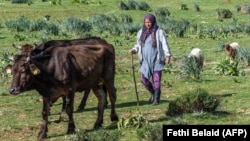About 36 percent of women around the world work in agrifood systems, according to the United Nations Food and Agriculture Organization, or FAO. In sub-Saharan Africa, the number rises to 66 percent; and in South Asia, it is 71 percent. And increasingly, these women work off the farm.
But everywhere, inequality and discrimination are creating roadblocks for women in agrifood systems. Across the globe, women typically work in worse conditions than men and for lower wages, and many countries still have inadequate legal protections for women's land ownership.
Until they have full access to, and control over livestock, water and seeds as well as the land, technology and the finance needed to grow their livelihoods, women cannot make a full contribution to agrifood systems, according to a recent FAO report.
“If women in the agrifood system had access to the same services as men, not more - just the same - we could unlock $1 trillion in gross domestic product and decrease the number of hungry people by 45 million,” said USAID Feed the Future Deputy Coordinator Dina Esposito. That is why USAID announced a commitment called Generating Resilience and Opportunities for Women, or GROW.
“[T]here are three lines of effort. The first is focused on productivity and resilience of women farmers. And in our sort of parlance, resilience is the ability for someone to cope, adapt, and even thrive in the face of shocks,” she said. “It's about what are the capacities that already exist in a system or in a community, and how do we bolster those capacities to help people address risk.”
“Our commitment is to double the number of women applying improved technologies and management practices on farms,” said Deputy Coordinator Esposito. “[W]e’re going to focus on ... access to land, higher yielding climate-smart seeds, and fertilizer, finance, information, and technology.”
“The second pillar,” said Dina Esposito, “is helping women improve the quality and pay off of farm jobs.”
“And then the third area is around really making sure that the unique needs of men and women and the gender differences of how people experience conflict is thought about as we deliver our humanitarian action,” she said.
“[G]ender equality,” said Deputy Coordinator Dina Esposito, “is not just right – it’s profitable, it’s smart, and it’s key to building more resilient food systems.”














